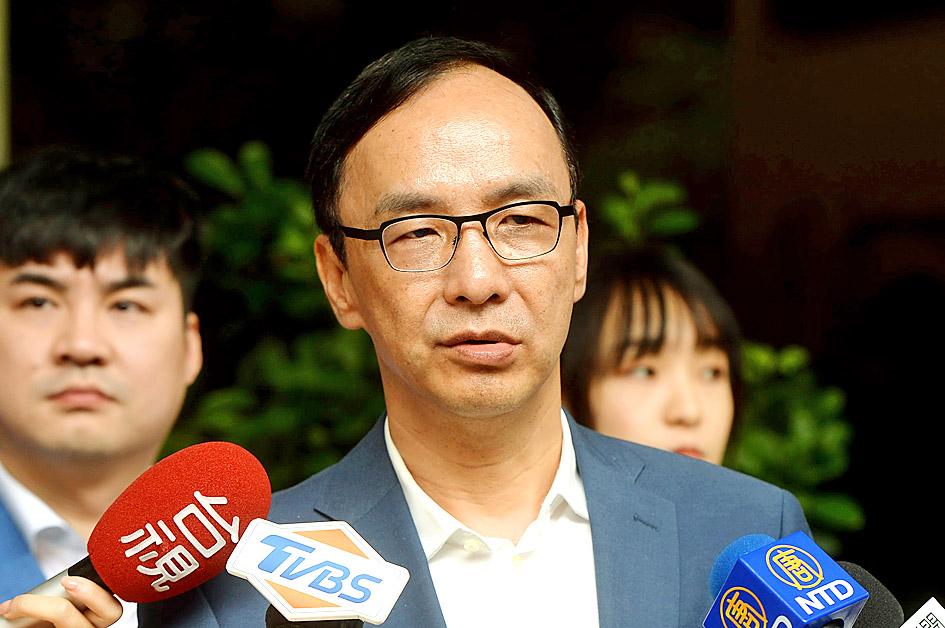Former Chinese Nationalist Party (KMT) chairman Eric Chu (朱立倫) on Tuesday said that Taiwan must not take sides in the US presidential election, adding that the nation’s security has to be its top priority amid a confrontation between the US and China.
“Taiwan must adhere to its own position in the face of the confrontation between the US and China. Taiwan’s national interest must be its first concern and cross-strait peace is the most important issue,” Chu said in response to media queries for comments after attending a video conference on US-China-Taiwan ties and the US presidential election hosted by Shelley Rigger, a professor at Davidson College.
Chu said he is sure that President Tsai Ing-wen (蔡英文) is fully aware of the danger posed by Taiwan siding with either candidate in the election and warned that to do so would risk catastrophe.

Photo: Lin Cheng-kung, Taipei Times
US academics taking part in the meeting also urged Taiwan not to take sides in the election, he said.
Asked which candidate he would prefer to win the election, Chu said he is neutral.
“No matter who wins the election, it is imperative that Taiwan and the US maintain close relations, which is extremely important to the nation’s security, and its trade and commerce,” he said.
US academics have said that Washington would continue to adhere to the position, and urged Taiwan not to base its security on any particular US administration or president, he said.

Taiwanese scientists have engineered plants that can capture about 50 percent more carbon dioxide and produce more than twice as many seeds as unmodified plants, a breakthrough they hope could one day help mitigate global warming and grow more food staples such as rice. If applied to major food crops, the new system could cut carbon emissions and raise yields “without additional equipment or labor costs,” Academia Sinica researcher and lead author the study Lu Kuan-jen (呂冠箴) said. Academia Sinica president James Liao (廖俊智) said that as humans emit 9.6 billion tonnes of carbon dioxide compared with the 220 billion tonnes absorbed

The Taipei Mass Rapid Transit (MRT) Wanda-Zhonghe Line is 81.7 percent complete, with public opening targeted for the end of 2027, New Taipei City Mayor Hou You-yi (侯友宜) said today. Surrounding roads are to be open to the public by the end of next year, Hou said during an inspection of construction progress. The 9.5km line, featuring nine underground stations and one depot, is expected to connect Chiang Kai-shek Memorial Hall Station to Chukuang Station in New Taipei City’s Jhonghe District (中和). All 18 tunnels for the line are complete, while the main structures of the stations and depot are mostly finished, he

Taipei is to implement widespread road closures around Taipei 101 on Friday to make way for large crowds during the Double Ten National Day celebration, the Taipei Department of Transportation said. A four-minute fireworks display is to be launched from the skyscraper, along with a performance by 500 drones flying in formation above the nearby Nanshan A21 site, starting at 10pm. Vehicle restrictions would occur in phases, they said. From 5pm to 9pm, inner lanes of Songshou Road between Taipei City Hall and Taipei 101 are to be closed, with only the outer lanes remaining open. Between 9pm and 9:40pm, the section is

China’s plan to deploy a new hypersonic ballistic missile at a Chinese People’s Liberation Army Rocket Force (PLARF) base near Taiwan likely targets US airbases and ships in the western Pacific, but it would also present new threats to Taiwan, defense experts said. The New York Times — citing a US Department of Defense report from last year on China’s military power — on Monday reported in an article titled “The missiles threatening Taiwan” that China has stockpiled 3,500 missiles, 1.5 times more than four years earlier. Although it is unclear how many of those missiles were targeting Taiwan, the newspaper reported